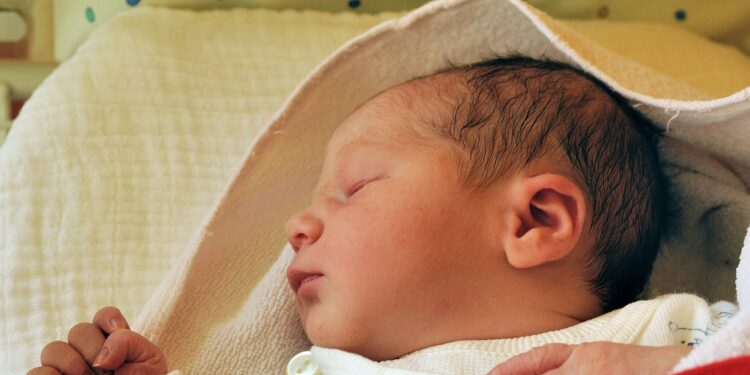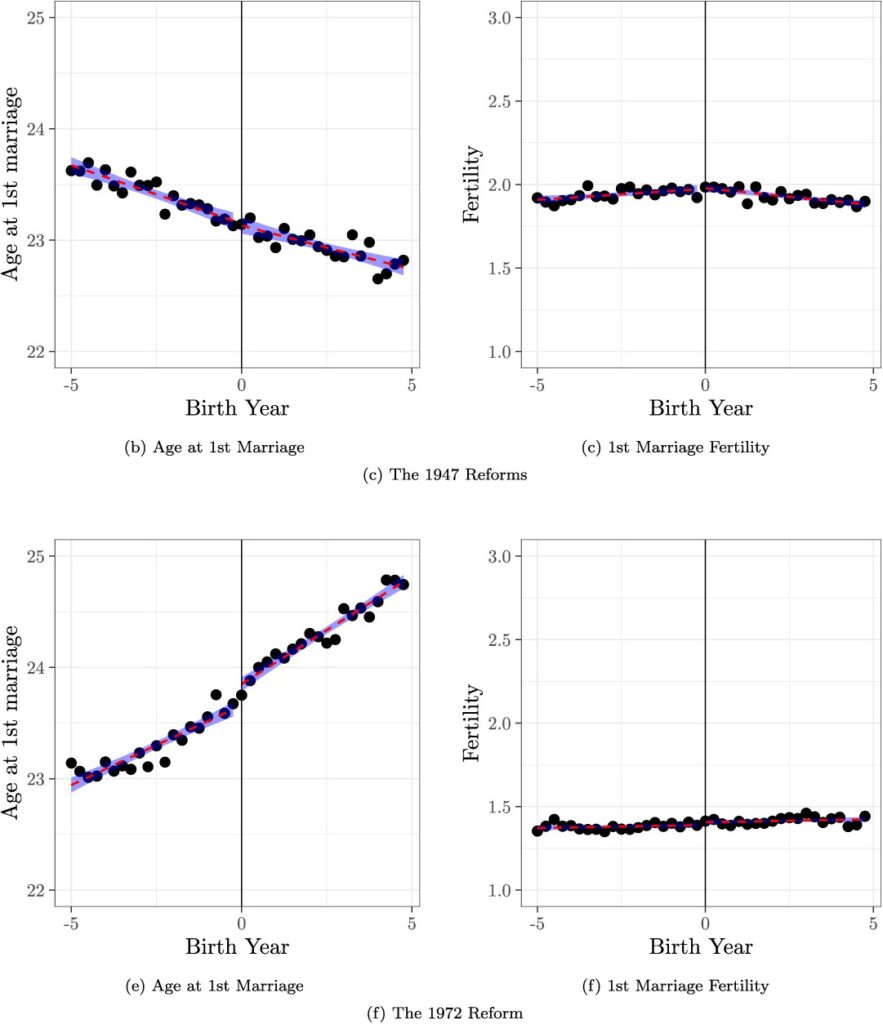One of the most consistent findings in the social sciences is the negative association between education and fertility. This association appears when you compare more and less educated individuals within a country, and when you compare countries with different levels of education. The chart below shows the relationship between average years of schooling among women aged 15–64 and the total fertility rate. As you can see, it is strong and negative.
There are two main theories for why education is negatively associated with fertility. The economic theory says that education increases the opportunity cost of having children by raising women’s earnings potential. The cultural theory says that education changes women’s values, leading them to prioritise career over childbearing. Both theories may be true in part.
All this matters, of course, because the world — especially the Western world — is going through a fertility crisis. Not a single country in Europe has a birth rate above the replacement level—even the Nordic countries, which once bucked the trend toward low fertility, now have TFRs less than 1.6 children per woman. Why have birth rates cratered? One plausible explanation is rising education among women.
However, a new paper using a clever method finds that education may not have any effect on fertility after all. Neil Cummins managed to link birth and marriage records for a large sample of English women born during the 20th century. This enabled him to assemble a dataset with the women’s ages, their ages at marriage, and the number of children they had during the course of their lives.
His clever method to test whether education affects fertility was comparing women who were affected by compulsory schooling laws (which required them to stay in school for an extra year) to those who were born just before (and therefore weren’t required to stay in school for an extra year). The comparison serves as a ‘natural experiment’, where the ‘treatment’ is getting one more year of education.
Cummins’ results are shown below. The top panel corresponds to the 1947 reform, which extended compulsory schooling from age 14 to age 15. The bottom panel corresponds to the 1972 reform, which extended it further from age 15 to age 16. In each chart, the dots on the right-hand side of the zero line correspond to cohorts of women who were affected by the reform, while the dots on the left-hand side correspond to cohorts that were not affected.
In the lower-left chart, there is a hint of a positive impact on age at first marriage. But in the other four, there is no evidence of any effect whatsoever. Women who were required to stay in school for an extra year had just as many children as their counterparts who weren’t.
How can Cummins’ findings be reconciled with the strong negative association between education and fertility? One possibility is that education has zero causal effect on fertility and what’s really going on is that broader cultural changes (related to the demise of traditional gender roles) cause women to become more educated and to have fewer children.
This is only one study, and it will need to be replicated by other researchers. But it may turn out that what many social scientists thought was true is, in fact, not true at all.














To join in with the discussion please make a donation to The Daily Sceptic.
Profanity and abuse will be removed and may lead to a permanent ban.
Just to do a ‘Captain Obvious’ here and point out that education, before we even include the disastrous mess that is higher ed, has changed dramatically since the decades mention above. So it seems a no-brainer to me that “education has zero causal effect on fertility” and it’s more to do with the woke ideological crapola kids are being brainwashed with these days. Kids should be attending school to get educated, not indoctrinated.
I would say that western civilisations have much more choice about having children or having a career than most poorer countries, this can be put down to a better education.
Not so much choice in places like Niger so they just do what is nessasary
They will probably never have a career to pay for a pension so children are their insurance policy for old age, the more the merrier as upto 50% of their children may not make it to adulthood.
I certainly agree with your ideological element though, just look at that self important little git Rachel Zegler!
Yes and you raise a good point which is the difference in *motivation* between cultures for having children. Women in some poor country in Africa won’t have any of the opportunities or resources of their counterparts in rich Western countries, therefore their motivation will be based more on necessity, as you say, plus cultural norms/pressure and gender stereotypes will be way more rigid. Over here, women can afford to wait and have kids later in life, have fewer kids or none at all, because they’re no longer deemed an “insurance policy”, unlike generations ago.
Let’s be honest, many in the so-called ‘rich West’ literally can’t ‘afford’ kids anyway because they’re unable to even get on the property ladder, which is the norm before putting down roots and starting a family. And people don’t typically live in multi-generational households, which is normal in other cultures, so childcare is presumably a non-issue compared with here.
Increased wealth.
More live births, lower infant/child mortality, children no longer required as a labour source for the family economy requires reduced birth rates to maintain the “stock”.
Plus sending children to school instead of to work = a cost, not a contributor to parental fortunes.
Parents work fewer hours, have more leisure time and disposable income which they prefer to spend on that rather than children.
Maybe has something to do with it?
Maybe material prosperity has led us to overthink things
I don’t think education is a primary cause of low fertility, though it may be a secondary cause. I think a primary cause of low fertility is little or no religious faith due to increasing wealth. Look at the chart of where high birth rates are found. This cause and effect are summed up by the bible phrase “you can’t worship God and mannon (money)”.
I don’t think it is education per se that makes a person rich. There are many examples that everyone knows of people who left school with few or no exams thar have become rich through hard work.
Increasing wealth includes many factors that would tend to increase birth rates such as improved nutrition and healthcare but the low birth rates in rich countries run counter to this.
Decreasing wealth does seem to encourage higher birth rates. My father’s parents in the 1930s had around 10 children but 3 or 4 died in childhood of diseases that are easily cured today. They were poor but had many children perhaps because unconsciously they knew some would die.
I agree with your point but it’s mammon not ‘mannon’.
Once upon a time, I grew up in an avenue of newly-built 1950’s semis, where at one time up to 30 of us played out in the street, offspring of married couples born before the Second World War.
Then along came “-isms,” “-ists” and “-ism-ist ism-isms,” and the old order changed – for better or for worse, for richer or for poorer, but nowadays up to half the time certainly not until death us do part.
The increased cost of housing is also a practical deterrent. Meanwhile on another forum…
https://www.louiseperry.co.uk/p/immigration-is-not-the-answer-to
“…What’s the solution to Britain’s fertility crisis? There are, broadly, three schools of thought:
One is that you can, through carefully structured incentives and social changes, encourage birth rates to rise to replacement levels.
Another is that the ageing population is, given the potential for automation, robotics and AI, actually not *that* much of an issue.
The final school of thought is that nothing can be done about the Western fertility crisis, and that the only solution is to supplement the working age-population with immigration. This, sadly, is the school which currently governs Great Britain.”
Take your pick – bad luck, the Party has already chosen for you.
No, but abortion does.
See this chart:
https://ourworldindata.org/grapher/children-born-per-woman?facet=entity&uniformYAxis=0&country=~GBR
1950 total fertility rate (TFR) of 2.22
1961 introduction of birth control pills on the NHS, TFR 2.79
1964 late post-war baby boom peak of TFR of 2.93
1967 Abortion Act, TFR 2.68
1974 introduction of birth control clinics, TFR 1.92
1977 a TFR low of 1.69
2001 a TFR low of 1.61
2010 TFR recovered to 1.92
2020 TFR dropped to 1.57 and leveling off through to 2023.
TFR seems to have stopped falling recently – perhaps it will rise again.
If fertility is reducing and climate change adaptation becomes the preferred policy then fewer people will make the social adjustments easier. We might need robot careers for the old, but even that issue will eventually reduce.
Picking one variable which happens to correlate with another from a whole variety of others which interact, is certain to lead to the wrong conclusion except by chance. See: Climageddon (Arctic disappearing, London, New York, submerged, annual droughts and scorching Summers, etc) perpetually being delayed; predicted 1970s world over-population by year 2 000.